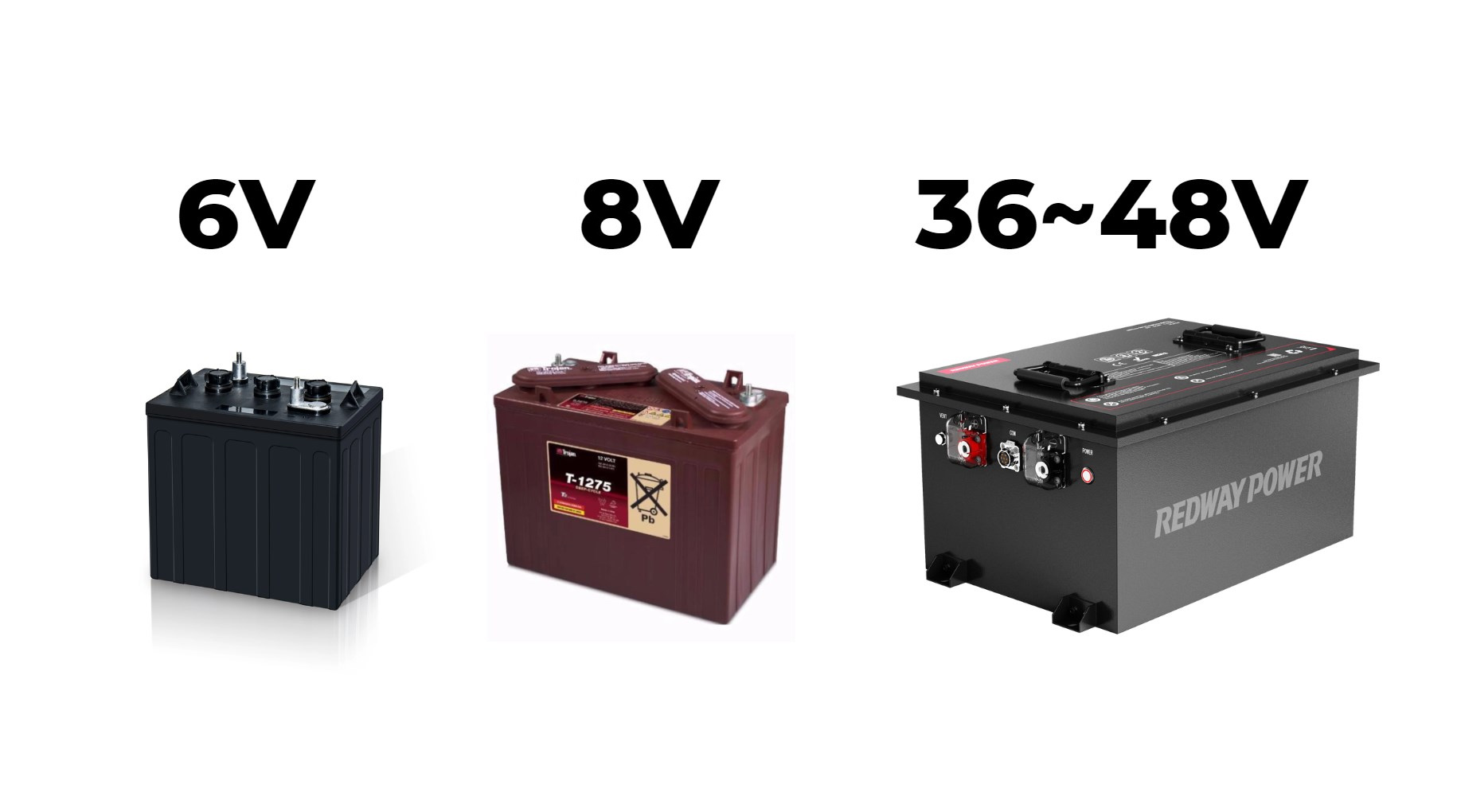Choosing the right battery voltage for your golf cart is crucial for maximizing performance, range, and efficiency. 6V, 8V, 36V, and 48V battery configurations offer distinct advantages depending on terrain, load, and usage. Redway Battery provides reliable lithium solutions that ensure faster charging, longer lifespan, and consistent power, making it a trusted choice for electric golf cart owners.
What Are the Differences Between 6V and 8V Golf Cart Batteries?
6-volt batteries are a classic option, typically connected in series to achieve higher system voltages like 36V. They are cost-effective and provide steady power, ideal for standard golf carts and flat terrains.
8-volt batteries offer slightly higher voltage per unit, improving acceleration and efficiency. Often used in 32V or 48V systems, they provide better performance for longer rides while maintaining reliability. Golf carts with 8V batteries strike a balance between power, range, and longevity.
Wholesale lithium golf cart batteries with 10-year life? Check here.
| Battery Type | Nominal Voltage | Common Series Configurations | Advantages |
|---|---|---|---|
| 6V | 6V | 6 x 6V = 36V | Cost-effective, reliable, high amp-hour capacity |
| 8V | 8V | 6 x 8V = 48V | Enhanced acceleration, efficiency, balanced performance |
How Do 36V and 48V Golf Cart Systems Compare?
A 36-volt system typically uses six 6V batteries in series, providing moderate power suitable for recreational use and light inclines. It is cost-efficient but less powerful on hilly terrains.
A 48-volt system, usually built from six 8V batteries, delivers higher torque, faster acceleration, and longer range. It is ideal for heavier loads, longer distances, and more demanding terrains, offering superior performance compared to 36V setups.
Want OEM lithium forklift batteries at wholesale prices? Check here.
| System Voltage | Power & Torque | Speed & Terrain Suitability | Efficiency |
|---|---|---|---|
| 36V | Moderate | Flat terrain, light use | Less efficient, higher amp draw |
| 48V | Higher | Hilly terrain, heavier loads | More efficient, lower amp draw |
Why Should You Consider Lithium Batteries for Your Golf Cart?
Switching to lithium batteries, like those from Redway Battery, offers numerous advantages over traditional lead-acid systems:
-
Lighter Weight: Improves handling, acceleration, and efficiency.
-
Faster Charging: Fully charges in 3-5 hours versus 8-12 hours for lead-acid.
-
Longer Lifespan: Lasts 8-10 years, with 3,000-5,000 cycles.
-
Zero Maintenance: No watering or terminal cleaning required.
-
Consistent Power: Maintains full voltage until nearly empty, providing smooth and reliable performance.
Can You Upgrade Your Golf Cart to a Higher Voltage System?
Yes, but compatibility must be checked. Upgrading from 36V to 48V lithium systems may require a compatible controller and charger. Ensure your motor and electronics can handle the higher voltage to avoid damage. Redway Battery supports full OEM/ODM customization, making upgrades safe and efficient for a wide range of golf carts.
Redway Expert Views
“Choosing the right battery voltage directly impacts your golf cart’s performance, range, and reliability. Our experience at Redway Battery shows that most users benefit from 48V lithium systems due to their superior efficiency and acceleration. Lithium technology provides long-term value, requiring minimal maintenance while delivering consistent power, making it an ideal upgrade from traditional lead-acid batteries.”
How Do Voltage Configurations Affect Performance and Efficiency?
The system voltage determines the cart’s speed, torque, and suitability for various terrains:
-
36V systems: Best for flat terrain and lighter use, moderate power, slightly lower efficiency.
-
48V systems: Ideal for hills, heavier loads, higher torque, and greater efficiency.
Choosing the right voltage ensures optimal energy use, longer battery life, and improved driving experience.
What Are Key Considerations When Choosing a Golf Cart Battery?
-
Terrain and Load: Steeper hills or heavier loads benefit from higher voltage systems.
-
Run Time Needs: Check the amp-hour rating to ensure adequate runtime.
-
Compatibility: Motor, controller, and charger must match the chosen voltage.
-
Maintenance: Lithium batteries reduce upkeep, while lead-acid requires regular monitoring.
-
Cost vs Performance: Balance upfront cost with long-term performance and durability.
Conclusion
Selecting the appropriate battery voltage for your golf cart is critical for achieving reliable performance, efficiency, and long-term satisfaction. 6V and 8V batteries provide flexible series configurations, while 36V suits light use and 48V excels for demanding applications. Upgrading to Redway Battery lithium packs ensures faster charging, lighter weight, and longer lifespan. Consider terrain, load, and compatibility to make the best choice for your electric golf cart.
Frequently Asked Questions
1. Can I use 6V and 8V batteries interchangeably?
They are not directly interchangeable; they must be configured properly in series to achieve the intended system voltage.
2. How long do Redway Battery lithium golf cart batteries last?
Typically 8-10 years with 3,000-5,000 charge cycles, significantly longer than lead-acid batteries.
3. Will switching to a 48V lithium system require new components?
Yes, ensure your motor, controller, and charger are compatible with 48V systems.
4. Do lithium batteries require maintenance?
No, lithium batteries are maintenance-free and do not require watering or cleaning of terminals.
5. Which system is better for hilly terrain?
A 48V lithium system is ideal for hilly or rough terrains due to higher torque and efficiency.






